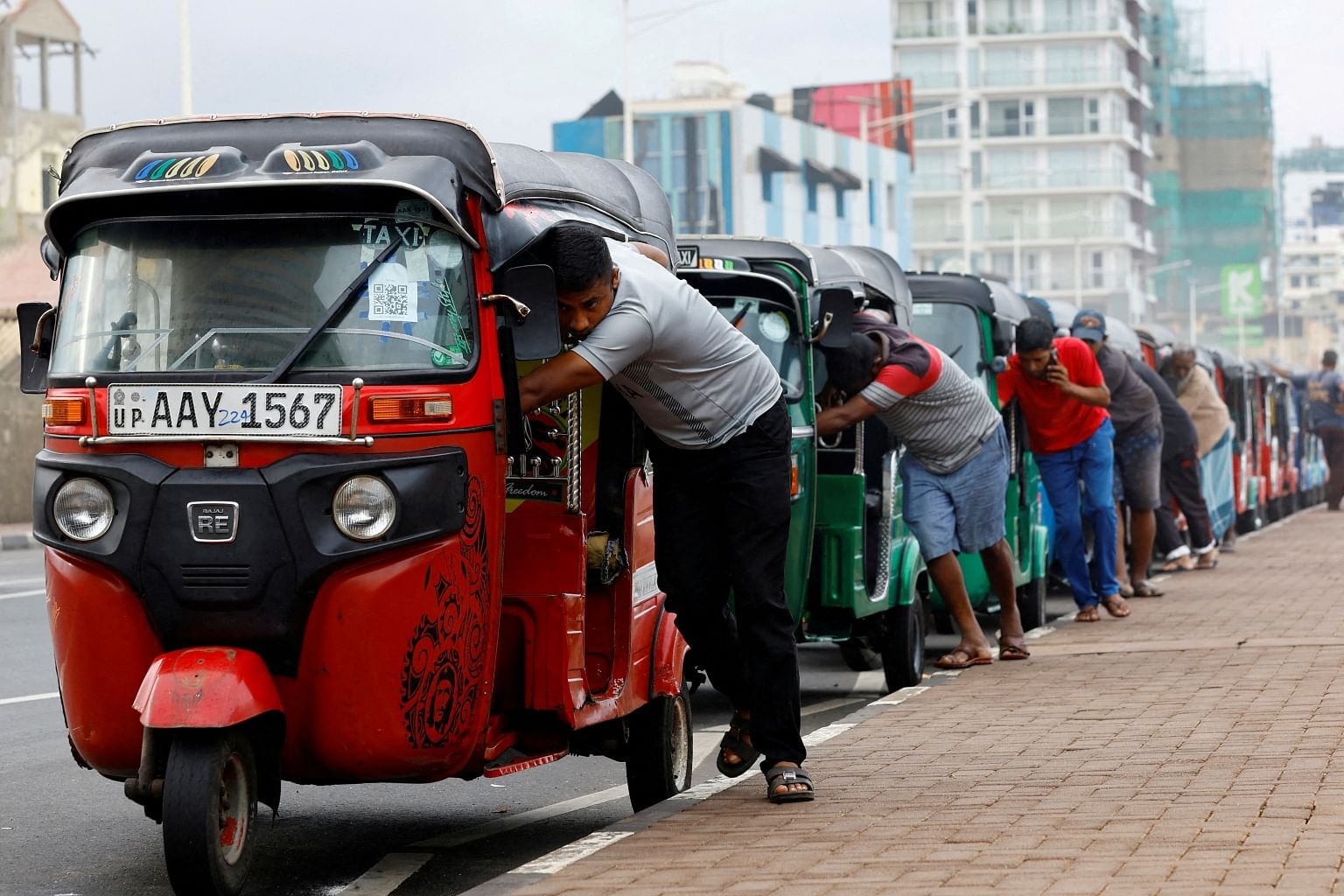Poor countries to benefit from proposed Russian oil price cap: US official
Sign up now: Get ST's newsletters delivered to your inbox

Drivers pushing their rickshaws in a line to buy petrol from a fuel station in Colombo, Sri Lanka, on July 29, 2022.
PHOTO: REUTERS
Follow topic:
SINGAPORE - Low- and middle-income countries will be the primary beneficiaries of a proposed price cap on Russia's oil trade, said Ms Catherine Wolfram, deputy assistant secretary for climate and energy economics at the United States Treasury.
The top US official, who is in town for the Asia-Pacific Petroleum Conference, added that the objective of keeping Russian oil flowing under the cap was to ensure that energy markets would not be hit by an oil price shock once a European Union ban on seaborne oil flows takes effect on Dec 5.
A second ban on petroleum products is due to be rolled out in February 2023.
Ms Wolfram told The Straits Times on the sidelines of the event at the Raffles City Convention Centre on Tuesday: "It's important to remember that the EU and the other Group of Seven (G-7) countries, and that includes the US, will not be importing Russian oil, so we will not be the beneficiaries of the cheap oil price.
"And while it serves our own interest in denying Russia the revenue to fund its brutal invasion (of Ukraine), we will not be the beneficiaries of the cheap oil. Instead, the economic benefits will flow to low- and middle-income countries."
She noted that under the price cap being proposed, the provision of services for the trade of Russian oil would be banned.
This would include access to insurance, trade finance, banking, brokering and navigation services.
"These provisions and the ban on these services will be taken up by other members of the price-cap coalition and by members of the G-7 countries, except when the trade takes place below the price cap."
Without the price cap, there is every chance that Russian oil would have to be kept off the market because a lack of access to these services would make it difficult for trade to actually take place, she added.
During a panel discussion at the conference on Monday, Ms Wolfram said the mechanics of the enforcement and the compliance were still being worked out, with the oil price cap level yet to be decided.
She said at a doorstop with the media that retrade of the oil would be possible as soon as the crude or the petroleum product landed on-land and passed through customs.
Senior energy executives attending the conference were less than supportive of the price cap, with most calling for more clarity on the actual mechanics of enforcement and compliance of the process.
Mr Amit Bilolikar, deputy general manager at India's Bharat Petroleum, said: "There appears to be challenges in the implementation of the price cap, and we still don't know where the price for the cap will be set and if Russia will agree to sell the oil at this level."
He warned that if the cap was set below the cost of production, it would not incentivise Russia to participate in this exercise led primarily by Western powers.
Mr Bilolikar said his company had been purchasing crude from Russia, and had been relying on insurance companies in the country to provide coverage on the trades.
Data provided by Refinitiv, a unit of the London Stock Exchange Group, shows Russia is the third-largest supplier of crude oil to Asia after Saudi Arabia and the United Arab Emirates.
India and China have been among the largest buyers of Russian crude since the invasion of Ukraine in late February.
On Monday, energy and commodity trader Vitol's chief executive, Mr Russell Hardy, said there were still many questions on the proposed cap.
"There is a great deal of policy discussions going ahead where the G-7 has announced that they wish to adopt a price cap, and they wish to get buy-in across the globe for people to pay not more than 'x' for Russian oil, but we've yet to see how that plays out, we've yet to see what the policy is, and the reaction to the policy."
Mr Saad Rahim, chief economist at global commodity trader Trafigura Group, said the proposed cap was not straightforward, especially in dealing with Russia.
"Right now, it's like a couple headed for divorce but still living in the same house, and at some point, it's going to be final. So let's see how that actually plays out."

